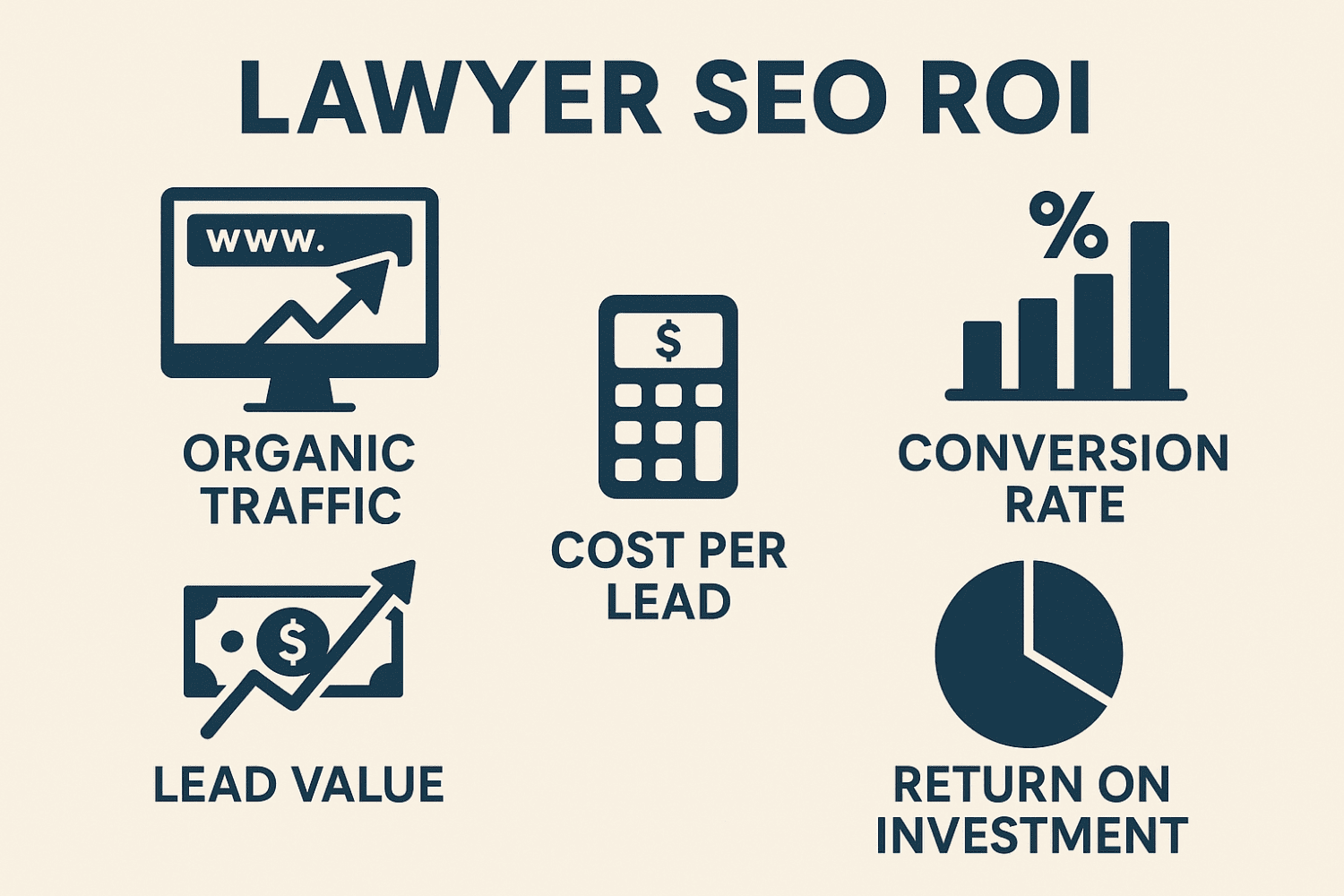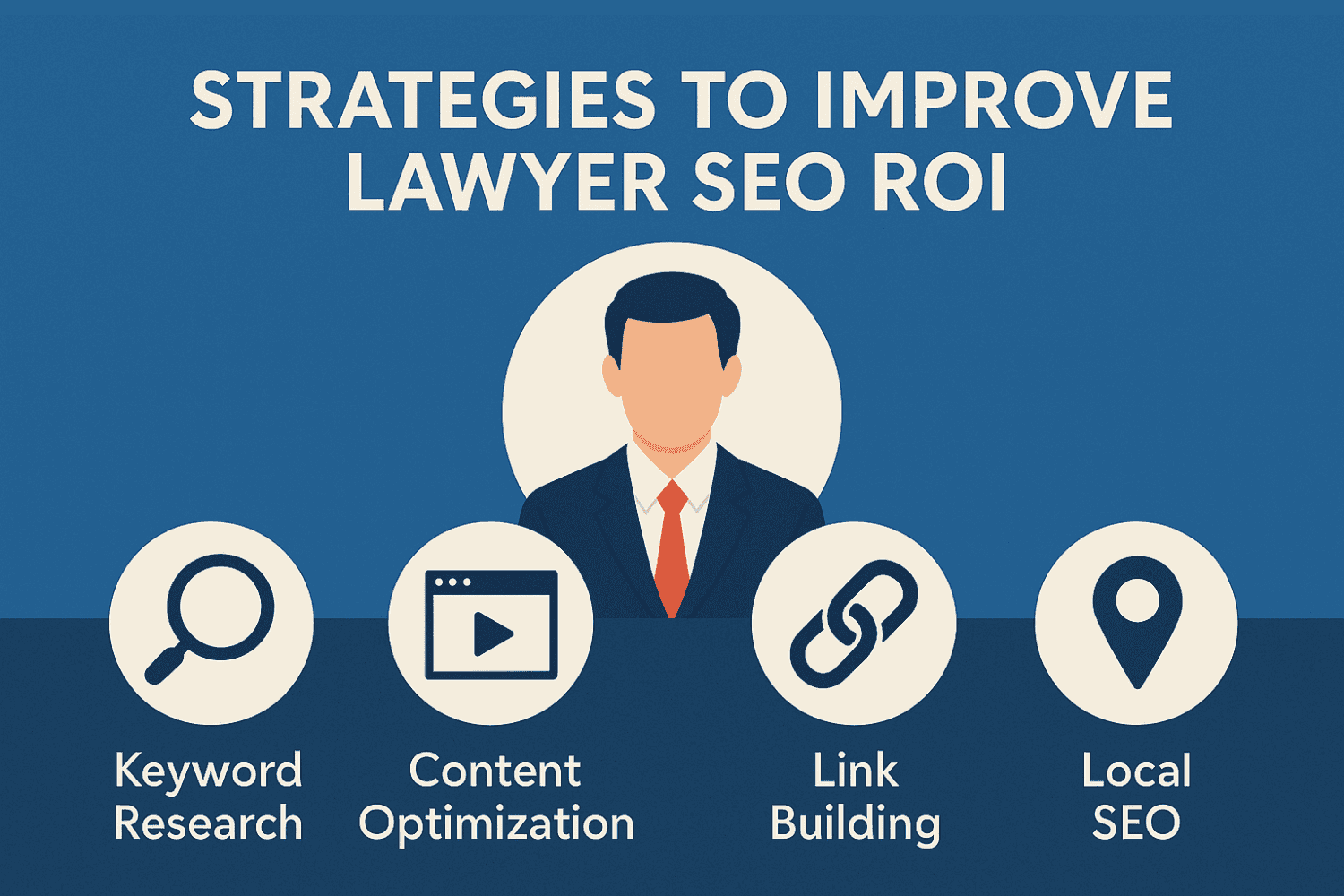Maximizing Lawyer SEO ROI: A Clear and Practical Guide
Wondering what return on investment (ROI) you’ll get from SEO for your law firm? This guide breaks down lawyer SEO ROI. You’ll learn why it’s vital, how to measure it, and strategies to boost your returns. Let’s dive in.
Key Takeaways
- Understanding SEO ROI is essential for law firms to gauge the profitability of their SEO investments, allocate resources effectively, and guide future budget decisions.
- Key metrics for measuring SEO ROI include organic traffic, keyword rankings, and conversion rates, which help law firms track the effectiveness of their SEO efforts.
- Successful SEO strategies can significantly enhance client inquiries and revenue for law firms, demonstrating the importance of long-term (4-24 months) commitment and consistent optimization efforts.
Understanding Lawyer SEO ROI


SEO ROI stands for the return on investment from SEO activities compared to the costs incurred. For law firms, understanding the ROI of SEO is crucial as it helps determine the profitability of their SEO investments. Measuring SEO ROI allows you to track SEO ROI and the effectiveness of your strategies and make informed budget decisions. This understanding not only guides you in optimizing your current SEO campaigns but also aids in making future financial decisions, including a forecast SEO ROI.
A clear forecast of SEO ROI enables law firms to allocate resources effectively, prioritize SEO efforts, and adjust strategies as needed. Effective SEO generates a positive ROI by increasing visibility, leading to higher client inquiries, and ultimately boosting revenue for law firms.
Over time, proper SEO efforts can enhance leads, pipeline, sales, and revenue, demonstrating the long-lasting benefits of a solid SEO strategy. Law firms should consider their average SEO budget and its potential returns to make informed decisions on budget allocations for their SEO program.
Key Metrics for Measuring Lawyer SEO ROI


Measuring SEO ROI involves tracking ROI several key metrics that indicate the effectiveness of your SEO efforts. For law firms, essential metrics include organic traffic, keyword rankings, and conversion rates. Monitoring these metrics helps in understanding how well your SEO campaigns are performing and where adjustments might be needed to optimize results.
Organic search remains a key source of traffic for law firm websites, highlighting the necessity of effective SEO strategies. SEO campaigns often focus on improving keyword rankings, which can significantly impact a law firm’s visibility and client inquiries.
Closely monitoring these SEO metrics helps law firms stay on the right path to achieving a good SEO ROI.
Organic Traffic Growth
Organic traffic refers to the visitors that come to a law firm’s website through search engines using relevant keywords. Achieving higher rankings on Google leads to increased traffic, which in turn generates more leads for law firms. Effective SEO increases exposure by ranking on the first page of SERPs, making it easier for potential clients to discover your content. This increased exposure leads to more organic impressions and traffic, fostering higher potential client interactions.
Law firms should monitor website traffic performance changes quarterly and during seasonal variations to optimize their SEO strategies. Tools like Google Analytics or web analytics tools are essential for tracking actual organic traffic data, providing insights into client interest and overall SEO performance. An SEO team can help implement these strategies effectively.
An example of successful organic search traffic growth is Reedsy, which increased its visitors from 200,000 to 2 million over five years. By closely monitoring and optimizing organic traffic growth, law firms can ensure their SEO efforts are yielding positive results.
Keyword Rankings
Ranking well for specific legal keywords is crucial for law firms as it directly affects visibility in search results and client inquiries. Tools like SE Ranking, Semrush, and Ahrefs are effective for conducting keyword research and tracking keyword rankings. A higher search ranking can significantly increase the Click Through Rate (CTR), indicating better engagement with potential clients through search listings.
Long-tail keywords, which cater to specific search intents, often have less competition and can improve rankings for law firms. By focusing on relevant keywords and optimizing for these key search terms, law firms can enhance their visibility and attract more qualified traffic.
Monitoring keyword rankings consistently helps in understanding the effectiveness of your SEO efforts and making necessary adjustments to improve search engine rankings.
Conversion Rates
The organic conversion rate is essential for law firms aiming to measure their return on SEO investment effectively. A higher Click Through Rate (CTR) indicates that law firm listings are attractive and relevant, impacting their visibility and potential to convert. However, more organic traffic figures do not automatically translate to high conversion rates; factors like content quality and engagement are crucial.
Engagement metrics, such as the number of pages per organic session, can reveal how compelling the content is and whether it leads to conversions. Tools like Google Analytics enable law firms to track conversions, such as contact form submissions and online transactions, providing a clear picture of how much revenue their SEO efforts are generating.
Improving conversion rates ensures that SEO strategies not only drive traffic but also convert visitors into clients.
Steps to Calculate Lawyer SEO ROI
Calculating SEO ROI involves several steps that help determine whether your SEO investments are paying off. The process includes calculating the total SEO investment, determining the value of organic conversions, and applying the ROI calculation formula. A structured approach is necessary to effectively assess the return on investment for SEO efforts in law firms.
Following these steps allows law firms to convert qualitative metrics into monetary values, offering a clearer picture of the actual value of an SEO campaign. This process not only helps in measuring current SEO performance but also aids in making informed decisions for future SEO investments.
Total SEO Investment
Total SEO investment refers to all costs associated with search engine optimization, encompassing agency fees, tools, content creation, and in-house resources. Components of total SEO investment include agency fees, content production costs, and staff salaries, which are crucial for an accurate investment calculation. Tracking all expenses related to SEO campaigns, including hidden costs like software subscriptions, is essential for effective investment monitoring.
Law firms can evaluate the costs of SEO tools by aggregating subscription costs for the relevant periods and analyzing in-house resource contributions based on time spent on tasks. When assessing the costs of in-house personnel, it’s important to convert part-time contributor expenses into hourly or daily rates to understand the contribution accurately.
The timeframe to break even on SEO investments can vary across law specialties, typically ranging from 10 to 16 months.
Value of Organic Conversions
Customer Lifetime Value (CLV) represents the total value a customer brings over their relationship with a business, which is crucial when evaluating SEO investments and business value. CLV can be calculated by using Average Purchase Value, Average Frequency Rate, and average customer lifetime value. An average lifetime value of $10,000 and a 25% conversion rate would result in an average lead value of $2,500.
The value of organic conversions can be determined by assigning a monetary value to each conversion event tracked in Google Analytics, including ecommerce events, assisted conversions, and conversion tracking. Law firms can estimate revenues generated from on-site conversions by assigning dollar values based on historical sales data.
To determine the total value of organic conversions, first multiply the total number of organic conversions. Then, apply the close rate to that figure. Establishing a direct link between SEO efforts and revenue through tracking organic conversions can have a noteworthy impact on overall profitability.
ROI Calculation Formula
The formula for calculating SEO ROI formula is (Value from SEO – Cost of SEO) / Cost of SEO. To convert the result of the basic ROI calculation to a percentage, multiply the decimal by 100. A good ROI outcome for an SEO campaign is often around 300% or higher, with some examples showing 400% ROI. Additionally, it’s essential to calculate ROI to ensure effective investment decisions.
To calculate SEO ROI, you need the SEO costs of investment in SEO and the value of conversions generated from that investment. Accurate tracking of these figures helps law firms determine if their SEO efforts are yielding a positive ROI and allows for performance improvements.
Benefits of High SEO ROI for Law Firms


Achieving a high SEO ROI allows law firms to lower client acquisition costs due to sustained visibility and engagement. Long-term growth is facilitated as a strong SEO presence generates consistent leads without the need for ongoing ad spending. Utilizing a comprehensive SEO strategy can significantly enhance a law firm’s visibility and attract more clients.
Focusing on high-return strategies allows law firms to maximize their SEO investments as their business model and SEO strategy progresses and see increased revenue. This not only improves the bottom line but also ensures continuous growth and success in the competitive legal market.
Strategies to Improve Lawyer SEO ROI


Implementing effective strategies is key to ensuring high returns from SEO efforts. Concentrating on strategies that yield high ROI can lead to better returns and more revenue. By targeting long-tail keywords, law firms can attract more qualified traffic, resulting in more leads, sales, and revenue.
The following subsections will discuss specific strategies to improve SEO ROI, including optimizing local listings, creating high-quality legal content, and leveraging reviews and testimonials using SEO tactics.
Optimize Local Listings
Local search rankings are essential for visibility in ‘near me’ queries, which are common for legal services. Claiming and properly managing a Google Business Profile is crucial for local search success and improves visibility. A well-optimized Google Business Profile can increase a law firm’s visibility by making it appear in local search results where potential clients are looking.
After optimizing their Google Business Profile, The Lovely Law Firm saw a rise in leads from approximately 1,300 in 2020 to over 5,500 in 2024. Expanding their online presence beyond Myrtle Beach helped The Lovely Law Firm generate nearly 7,000 leads through local listings.
Law firms that appear in the Local Pack can acquire clients at significantly lower costs compared to pay-per-click ads.
Create High-Quality Legal Content
Producing high-quality content is essential as it not only informs clients but also boosts SEO effectiveness. High-quality and shareable content results in greater traffic and leads, amplifying a law firm’s online presence. To achieve the best ROI from SEO, content should be helpful, informative, and align with SEO best practices.
Evergreen content ensures ongoing traffic and maintained relevance, solidifying online authority. Producing time-sensitive content can diminish SEO ROI due to quick obsolescence and reduced traffic over time.
The Lovely Law Firm attracted clients by creating early content on mass tort lawsuits, demonstrating the power of addressing common legal challenges.
Leverage Reviews and Testimonials
Encouraging client feedback and showcasing testimonials can enhance trust and improve local SEO performance. Positive reviews and testimonials can significantly boost a law firm’s credibility and attract more clients.
Leveraging reviews and testimonials improves local search rankings and visibility for law firms.
Challenges in Measuring Lawyer SEO ROI
Many law firms face challenges in measuring SEO ROI due to various complexities in data and multiple marketing channels. Attribution complexity arises as law firms often struggle to pinpoint exactly how much of their success can be attributed to SEO efforts because of interactions with other marketing channels. This complexity makes it difficult to measure the precise impact of SEO on overall performance.
Additionally, the long-term nature of SEO can result in prolonged periods before seeing the return on investment, which can be frustrating for law firms seeking quick results. Measuring specific metrics such as keyword rankings and conversions can also be challenging due to their indirect correlation with SEO performance; it requires precise tracking methods to analyze effectively.
Understanding these challenges is crucial for developing strategies to overcome them and accurately measure SEO ROI.
Attribution Complexity
Forecasting SEO ROI for SEO is virtually impossible due to complexities like multi-channel interactions. B2B businesses often face challenges in calculating SEO value due to lengthy sales cycles requiring multiple touches to generate qualified leads. Conversions aided by SEO may not always represent the last interaction, complicating the attribution process across channels.
Utilizing tools like Google Analytics can help track user interactions and revenue generated from organic search efforts. Tracking as many data points as possible enhances the understanding of user interactions with the ecommerce store and ecommerce stores. Understanding common paths to conversion through an ecommerce purchases journey report can clarify how different marketing channels contribute.
Unexpected search trends and competing content can significantly impact the results of SEO campaigns and organic search results. Additionally, Google SERP updates also play a critical role in determining campaign outcomes.
Long-Term Nature of SEO
SEO is a long-term investment where results compound over time. Full effects of SEO efforts take months to see, often ranging from 4 to over 24 months. SEO results grow over time, delivering traffic for years as long-term rankings are achieved.
The ROI from SEO should be calculated over a specific time frame due to the progressive and compounding nature of results. Patience and consistent effort are essential for seeing the full benefits of SEO investments.
Understanding the long-term nature of SEO helps law firms set realistic expectations and develop sustainable strategies.
Tools for Tracking Lawyer SEO Performance
![]()
![]()
Tracking SEO performance is critical for law firms to understand their search visibility and effectiveness in attracting clients. Google Analytics is effective for tracking organic traffic and user behavior. Google Search Console helps analyze keyword rankings and their performance over time. These tools provide essential insights that help in measuring SEO ROI and making informed decisions about SEO services.
TrackRight can monitor keyword positions and perform competitor analysis specifically for the legal sector. Ahrefs offers comprehensive insights into keyword research, backlinks, and ongoing performance tracking.
Google Data Studio can create easy-to-understand reports visualizing SEO performance metrics. Crazy Egg provides features for analyzing user interactions and sessions, which can boost lead generation efforts. Prioritizing these tools is recommended for law firms looking to effectively track their SEO performance.
Case Studies: Successful Lawyer SEO Campaigns
A law firm specializing in DUI defense saw a 681% increase in organic users after implementing targeted link building strategies, including guest blog posting and local SEO submissions. The Lovely Law Firm increased its signed cases from 20 to a target of 50 per month after implementing a tailored SEO strategy. These examples demonstrate how effective SEO strategies can translate to measurable ROI and significant growth for law firms.
Successful SEO campaigns can lead to significant increases in client acquisitions and revenue for law firms. Focusing on targeted strategies and consistent efforts enables law firms to achieve substantial growth and see tangible results from their SEO investments.
How Can Robben Media Help
Robben Media specializes in enhancing the online visibility of law firms through tailored SEO strategies. The agency employs advanced SEO techniques that include content optimization, link building, and technical SEO to improve law firm rankings. Robben Media emphasizes the importance of clear communication and transparency in their partnerships with law firms.
The agency focuses on understanding the unique needs of law firms, ensuring that SEO strategies align with their specific practice areas. Utilizing data-driven approaches, Robben Media assesses the effectiveness of SEO campaigns and delivers measurable results that contribute to the growth and success of law firms, in collaboration with an seo agency and seo agencies.
Summary
Understanding and maximizing SEO ROI is crucial for law firms looking to optimize their marketing strategies and see tangible results. By tracking key metrics, calculating the value of organic conversions, and implementing effective strategies, law firms can achieve a high SEO ROI and boost their visibility and client acquisitions.
Robben Media’s expertise in local SEO can help law firms navigate the complexities of SEO and achieve long-term success. By focusing on data-driven decisions, clear communication, and tailored strategies, Robben Media ensures that law firms see measurable results from their SEO efforts. Take the first step towards maximizing your SEO ROI and see your law firm grow.
Frequently Asked Questions
What is SEO ROI?
SEO ROI measures the profitability of SEO activities by comparing the returns generated against the costs incurred, enabling law firms to make informed decisions about their SEO investments.
Why is measuring SEO ROI important for law firms?
Measuring SEO ROI is essential for law firms as it enables them to assess the financial benefits of their SEO efforts, track performance, and make informed budget decisions. This approach ultimately ensures that marketing strategies are optimized for maximum return on investment.
What are the key metrics for measuring SEO ROI?
The key metrics for measuring SEO ROI are organic traffic, keyword rankings, and conversion rates. These indicators provide insight into the effectiveness of your SEO strategies and inform necessary adjustments for improved performance.
How can law firms improve their SEO ROI?
To enhance SEO ROI, law firms should focus on optimizing local listings, producing high-quality legal content, and effectively using reviews and testimonials. Implementing these strategies will attract qualified traffic, generate leads, and boost overall visibility.
How can Robben Media help law firms with their SEO efforts?
Robben Media can significantly improve law firms’ SEO efforts by implementing customized strategies that enhance online visibility and utilizing advanced techniques that provide measurable results. Their commitment to clear communication and transparency ensures that law firms can track their growth effectively.




